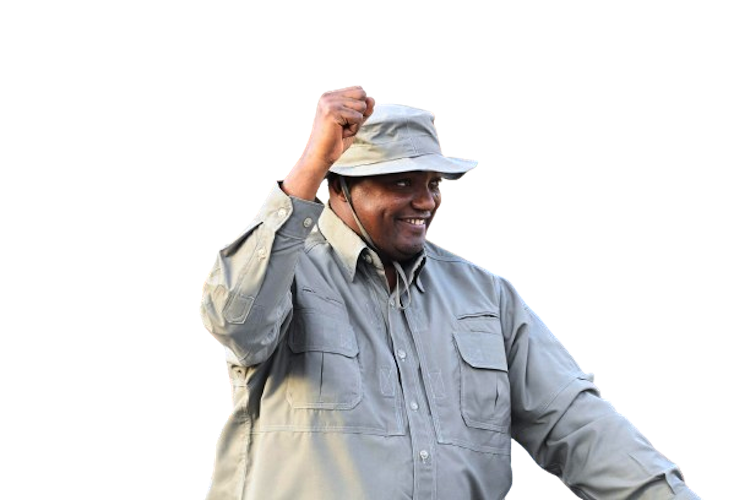Gambiaj.com – (Banjul, The Gambia) – Unless something dramatic changes between now and 2026, President Adama Barrow appears firmly on course for a third term in office. That may be an uncomfortable truth for his critics, but the facts on the ground—and within the political opposition—suggest that Barrow’s re-election prospects are stronger than ever.
It’s not just about what Barrow has done. It’s also about what the opposition hasn’t. This isn’t merely a story of an incumbent leveraging state power. It’s also one of a fragmented opposition, missed opportunities for reform, and the political capital Barrow has quietly built in the minds of many Gambians.
The Power of Incumbency Versus UDP’s Familiar Dilemmas
President Barrow may not inspire with soaring rhetoric or electrify crowds, but he holds the single most decisive advantage in Gambian politics: the presidency itself. With that comes unparalleled visibility, access to state resources, and the ability to deliver infrastructure projects—often strategically timed to coincide with electoral cycles.
His government has improved rural road networks, expanded electricity access, and upgraded health and education facilities.
While these projects may not be transformative in scale, they are visible and felt—particularly in parts of the country where development has long lagged behind. For many voters, these tangible benefits outweigh the opposition’s theoretical promises.
Meanwhile, the United Democratic Party (UDP) remains the biggest threat to Barrow’s hold on power, but it is caught in an old trap: the Darboe question.
Ousainou Darboe remains a towering figure in Gambian politics, but his record—three unsuccessful presidential bids—and advancing age have left even loyal supporters wondering if the party needs fresh leadership.
The problem is, no credible successor has emerged. The internal debate on who should carry the UDP’s banner in 2026 has turned into a slow-moving identity crisis. Meanwhile, Barrow is not just campaigning—he’s governing.
The longer the UDP takes to resolve its internal issues, the less time it will have to challenge an incumbent with the full machinery of the state behind him.
The Illusion of an Opposition Coalition Compounded by Failed Constitutional Reforms
Every election season brings renewed talk of an opposition coalition. But the reality is far less inspiring. Ideological divisions, clashing egos, and entrenched regional interests have repeatedly thwarted any serious effort at unity.
The failure to present a united front in 2021 is repeating itself, and once again, Barrow stands to benefit from a splintered opposition.
Unless opposition parties are willing to set aside personal ambitions and agree on a common agenda—and candidate—they are simply handing Barrow an electoral advantage on a silver platter.
Two attempts at constitutional reform—one in 2020 and another more recently in 2025—have failed. While the 2024 draft constitution proposed a two-term presidential limit, it would not have applied retroactively. In effect, Barrow would have remained eligible to contest in 2026.
Still, the collapse of the reform effort did more than preserve Barrow’s eligibility—it undermined public confidence in the democratic process. And yet, with each failed reform, Barrow gains ground by default, continuing to operate under the 1997 Constitution with no term limits in sight.
Corruption, Peace, Stability, and the Post-Jammeh Legacy
Corruption allegations continue to swirl around the Barrow administration. But the opposition is hardly immune. Several opposition-led councils and officials, especially within the UDP, have also faced accusations of financial mismanagement.
This moral equivalency dilutes the opposition’s ability to campaign credibly on integrity and probity.
In such an environment, voters may see corruption as a national problem rather than a partisan one—and stick with the candidate who offers stability and familiarity.
Meanwhile, despite criticisms over the pace of reform and lingering concerns about corruption, many Gambians recognize that today’s political climate is markedly freer than during the Jammeh era. People can speak more openly. Media houses operate with relative autonomy. There are fewer reports of state-sponsored repression.
For a population still scarred by decades of dictatorship, peace and personal freedoms are not small achievements. They matter—sometimes more than promises of sweeping change.
Of course, no political outcome is guaranteed. Unexpected events—a major scandal, economic collapse, or an energized youth movement—could change the equation.
But at present, the opposition appears divided, underprepared, and unconvincing. Meanwhile, Barrow is doing what incumbents do best: leveraging state resources, maintaining visibility, and keeping his base secure.
He may not be universally loved, but President Barrow’s path to re-election is looking clearer than ever—and the opposition has only itself to blame.










